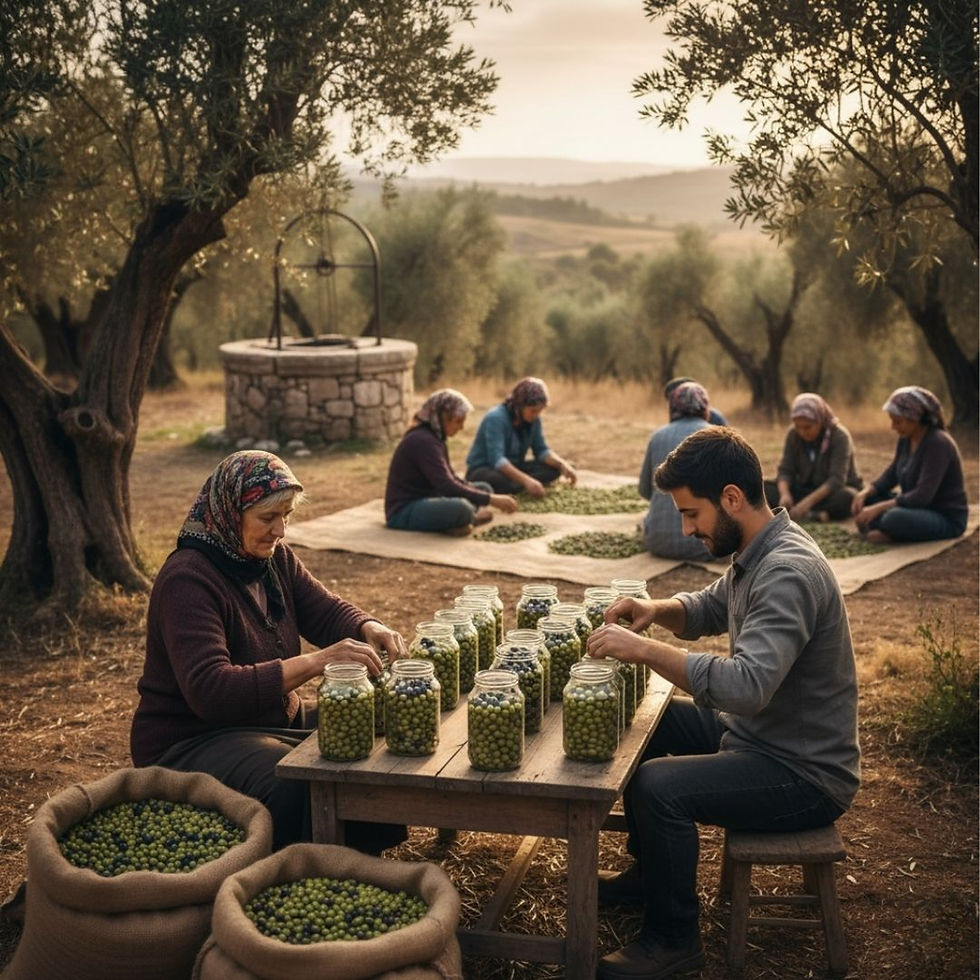Consumers' Guide to Choosing the Perfect Olive
- fethi çelik

- Apr 28, 2025
- 3 min read
Gemlik Fermented Olive Defects: Factors Affecting Quality
Gemlik olives , one of Turkey's most valuable table olives, have gained worldwide fame, especially after being processed with the fermentation method. However, as with every agricultural product, various defects can occur in Gemlik fermented olives. In this article, we will discuss all aspects of what Gemlik fermented olive defects are, how they occur and how they can be prevented.
What is Fermented Olive?
First, let's briefly touch on the concept of fermented olives. Fermented olives are obtained by naturally or controlled fermentation of olive fruit in salt water (brine) to make it edible. During this process, the bitter peppery taste (oleuropein) in the olive is broken down and the olive becomes edible.
Gemlik fermented olives are one of the best examples of this process. Their thin skin, small seeds and high oil content distinguish them from other table olives. However, if fermentation is not managed correctly, product quality can be seriously affected.

Major Defects Seen in Gemlik Fermented Olives
Some typical defects that reduce the quality of Gemlik fermented olives are:
1. Softness
When the fermentation process is not managed well, olives become overly soft and lose texture. Softened olives are perceived by the consumer as “stale” or “spoiled.”
Reasons:
Low salt content in brine
Uncontrolled continuation of fermentation
Temperature fluctuations
Prevention:
Use of brine containing 8–10% salt
Keeping the fermentation temperature constant between 20–25°C
2. Bloating
It is the formation of visible swellings in the olive fruit. It occurs especially in the later stages of fermentation in brine.
Reasons:
The proliferation of unwanted gas-forming bacteria instead of lactic acid bacteria
Incorrect salt balance
Contact with air
Prevention:
Regular control of brine and renewal when necessary
Fermentation in closed systems
3. Odor Deterioration (Off-odors)
Gemlik fermented olives should have a characteristic aroma. However, poorly managed fermentation can result in unpleasant odors such as vinegar, rotten or yeasty odors.
Reasons:
Excessively long fermentation time
Deteriorated brine environment
Inappropriate hygiene conditions
Prevention:
Stabilizing the pH value of the brine between 4.0–4.3
Providing a hygienic production environment
4. Skin Sloughing
A gap forms between the shell and the flesh and the shell can peel off. This creates an unfavorable appearance and texture problem for the consumer.
Reasons:
Sudden temperature changes
Excessive decrease in brine acidity
Long-term low salt concentration
Prevention:
Regular monitoring of brine temperature and acidity
Improving storage conditions of products
5. Color Defects
The typical color of Gemlik olives should be shiny black or dark purple. However, some fermentation errors can lead to brown, grayish or blotchy colors.
Reasons:
Failure to ferment properly
Iron (Fe) ions transmitted from metal equipment
Excess oxygen in the brine environment
Prevention:
Use of materials suitable for food contact
Reducing contact with oxygen during fermentation
Other Factors Affecting the Quality of Gemlik Fermented Olives
Apart from the fermentation process, other factors that may affect the quality of Gemlik fermented olives are:
Harvest Time: Olives harvested too early or too late may not be suitable for fermentation.
Handling and Storage: Crushing or damaging the olives causes the onset of defects.
Processing Time: If the processing time is prolonged after harvest, undesirable microbial activities begin.
Climatic Conditions: Especially hot and humid weather can cause fermentation to progress unevenly.
How to Identify Defective Olives?
For a consumer, defective Gemlik fermented olives can be distinguished as follows:
If the olive has an extremely soft and crumbly texture
If there are brown spots on the olives
If the brine has a vinegar smell or a bad yeast smell
If the olive taste is too sour or has a spoiled aroma
These symptoms seriously affect quality at both production and consumption stages.
What to Do to Maintain Quality
Reliable producer selection: Manufacturers with certified and controlled production should be preferred.
Product packaging control: If preservatives are stated on the label, care should be taken.
Proper storage: After purchase, olives should be stored in the refrigerator and consumed within a short time.
Result: Perfect Gemlik Fermented Olives Increase Their Value
The most important factor that determines quality in Gemlik fermented olive production is the correct and careful fermentation process. At every stage where fermentation is not managed correctly, defects may occur in the olives and both the flavor and value of the product may decrease.
When factors such as the producer's professionalism, brine management, hygienic conditions and the right harvest time come together, a perfect Gemlik fermented olive reaches our tables. For healthy and delicious tables,



Comments